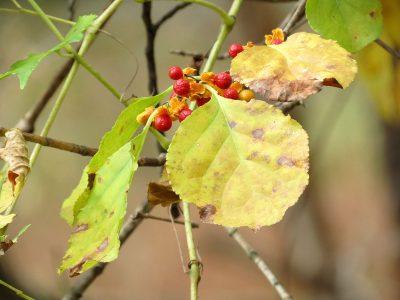
As households begin to bring home their Christmas trees and hang up their festive wreaths, the Massachusetts Division of Wildlife and Fisheries is urging residents to avoid using invasive plants in their holiday decorations.
Two eye-catching invasive plants that most commonly appear in holiday decorations are the oriental bittersweet and the multiflora rose, both of which boast small and vibrant berries, according to a MassWildlife advisory. Birds might feast on the fruits of an invasive plant hanging on a garland, then carry their seeds to local areas where the botanic invader can sprout anew.
Wayne Mezitt, chairperson of the Massachusetts Invasive Plant Advisory Group, said both bittersweet and multiflora rose are bountiful where he lives in Hopkinton. However, he said bittersweet is a lesser concern compared to the latter.
“[Bittersweet] is pretty much diminished by Thanksgiving time, it’s mostly just red berries that are falling off at this point,” Mezitt said. “The rosa multiflora is one that is used a lot because it’s got tight little berries on them, sort of pear-shaped and red. And people use them because they’re colorful.”
Invasive plants are classified as such because they tend to dominate any area they are introduced to, Mezitt said, proliferating until they ultimately push out the flora originally present.
“Bittersweet can even kill mature trees through strangling,” the press release stated. “Both plants are extremely difficult to control; when cut off, the remaining plant segment in the ground will re-sprout.”
These species can cause “extreme environmental damage,” according to the MassWildlife advisory.
Mezitt said most invasive plants thrive only in areas where the soil has been disturbed, whether by animals or human action.
“They are deposited by birds and wind and people who accidentally or purposely plant them, not knowing what the consequences are,” Mezitt said. “Usually a forest can pretty much take care of itself until the plants are introduced.”
Currently 69 plant species in Massachusetts are recognized by the MIPAG as invasive or latently so, labelled according to categories ranging from “Potentially Invasive” to “Likely Invasive” and “Invasive.”
Aside from the more visually appealing bittersweet and multiflora rose, Mezitt said other frequently found invasive plants include the rhamnus (or buckthorn), winged euonymus and Japanese barberry.
“I don’t think any of these are used for decoration,” Mezitt said. “Barberry has red berries, but they’re kind of sharp and people don’t use them.”
Tony Pereira, 28, of Allston said he plans to decorate this winter using mainly Christmas lights and garlands, and that he hadn’t really thought about invasive plants before.
“It makes sense that [invasive plants] don’t belong here,” Pereira said. “Personally, we use plastic. And it’s all inside.”
Ian Grosfelt, 28, of Allston said he thinks the warning sends a useful message.
“I’m a gardener, I work in gardens so I think that’s a great thing to put out there,” Grosfelt said. “I usually try to go with natives [when gardening], especially with the flower garden, and ornamentals.”
Venkatesh Prasad, 22, of Allston said this will be his first time celebrating Christmas in the U.S. Hailing from India, he said he has lived in the states for three months now and is excited to decorate.
“I’ve seen how many people actually celebrate here,” Prasad said. “So I was really fascinated by the amount of snow and various other things.”


















































































































